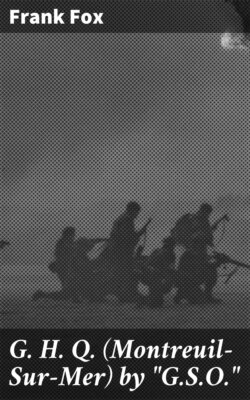Читать книгу G. H. Q. (Montreuil-Sur-Mer) by "G.S.O." - Frank Fox - Страница 3
На сайте Литреса книга снята с продажи.
FOREWORD.
ОглавлениеTable of Contents
That fantastic life at G.H.Q., so greatly detached from the normal—the life of the men whose words had power to send Armies into and out of action, to give this Division rest and surcease from the agony of the struggle, to assign to that Division the stress of a new effort; the men into whose hands the nation poured millions without stint and at whose call the whole world moved to spin or dig or forge—will it be of interest now to recall some of its memories, to attempt an intimate picture of its routine?
Fantastic the life was truly. One man of imagination, who had done his work in the line so well as to win a reputation for great courage and administrative ability, and had carried through with a quiet skill and a simple dutifulness the responsibilities of the "small family" of a regiment, found, when he was transferred to G.H.Q., that the sense of responsibility was too great for his temperament. He was not a very important cog of the machine. But the feeling that the motion which his hand started set going so great a series of actions got on his nerves to the extent that he could neither sleep nor eat with comfort, nor decide the simplest matter without torturing doubt as to whether it were right or wrong. He "moved on" within a few days.
Fortunately that sense of vision was rare. The average man was content to "carry on" with his task with what good judgment Heaven gave him, deciding as the established routine, or the common-sense shift of a new emergency, dictated.
But looking back, reflecting on all the woeful results that might have sprung from a careless blunder, from too great haste, from too deliberate hesitation, from over fear or over confidence, it is to be seen how fantastic, how abnormal was the life centred in that little walled town of Montreuil, the focus of a spider's web of wires, at one end of which were the soldiers in their trenches, at the other the workers of the world at their benches. Yet we ate, drank, slept, played a little and talked, very much as if we were workers in some commercial house, directing coffee from a plantation to a warehouse and then to a breakfast table, instead of dealing in blood and tears, drawing without stint on human life and human hope so that the idea of Right and Liberty might be saved in the world.
It is well that Imagination went to sleep, or was lacking. For so the work could be done and the war directed to its safe conclusion. But a record of the life we lived seems now, in retrospect, almost indecorous. It is as if we should not have munched food, talked trivialities, while before our eyes and under our hands was played out the greatest tragedy Man has known; as if it would have been more fitting if we had gone from uneasy couches, tight-lipped and anxious, to our desks, haunted always by a sense of doom.
It was not like that. And, such as it was, I attempt to record it—a serious enough life in any sense of the word, monkish in its denial of some pleasures, rigid in discipline, exacting in work, but neither austere nor anxious—such a life as studious boys might live in a Public School, if there can be imagined a Public School in which sport was reduced to the minimum essential to keep one fit for hard "swotting." But a life with some relaxations, and some pleasures, cheerful, actually light-hearted.
Questions of the conduct of the war must obtrude somewhat in this book, but it will be only in so much as they are a necessary background to the story of the life of G.H.Q.—of G.H.Q. in its later phase when it had moved from St. Omer to Montreuil and had become what it was in the final result, a capable Board of Directors of as glorious a company of soldiers as the world has known. There will be no attempt at a history of the war, no battle pictures, which are usually vain efforts to measure the immeasurable. Yet it is hoped that the reader will get from it some idea of the character and the complexities of the struggle.
Already fogs of controversy are obscuring many of the facts of the war. There is a controversy whether the first Commander-in-Chief should have been recalled when he was; about the merits of the second Commander-in-Chief; about the "unity of command" decision; about the relative merits of a strategy which would concentrate everything for a supreme effort in France and a strategy which would seek a "back door" to the German citadel; about the actual cause and duration of the shell shortage. In accordance with our British custom we are mostly taking sides, following some leader and putting our faith in his views, and all his views, implicitly. Thus are formed parties. I claim with honesty, and perhaps with correctness, not to belong to any of the parties. I have set down these observations on G.H.Q. without a thought of whether they may support this view or that view on the conduct of the war.
THE AUTHOR.
THE BOULOGNE GATE
